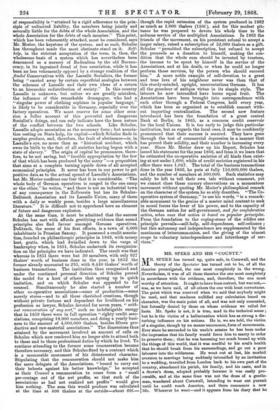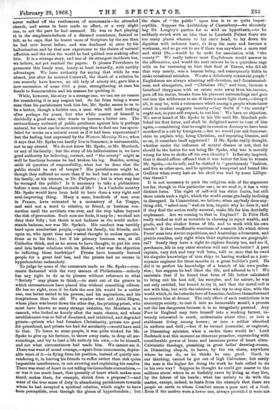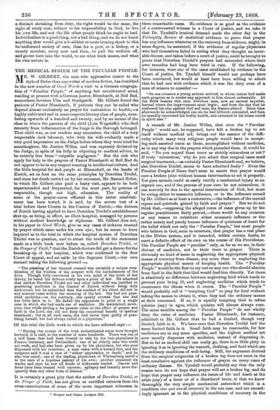MR. SPEKE AND HIS "COUNTY"
?SIR. SPEKE has turned up, quite safe, in Cornwall, and the theory of the Spectator has turned out to be, of all the theories promulgated, the one most completely in the wrong. Nevertheless, it was of all those theories the one most completely in accordance with the evidence, and, therefore, the one most worthy of attention. It ought to have been correct, but was not,— was, as we have said, of all others the one with least correctness. The point which was reserved when we said that anybody might be mad, and that madness nullified any calculation based on character, was the main point of all, and was not only concealed, but formally denied by those on whose evidence we relied for facts. Mr. Spoke is not, it is true, mad in the technical sense ; but he is the victim of a hallucination which has as strong a dis- turbing influence on his actions. He is, we are told, the victim of a singular, though by no means uncommon, form of monomania. Ever since he succeeded to his uncle's estates he has been under the impression that his family would force him to marry in order to preserve them ; that he was becoming too much bound up with the things of this world, that it was needful to his soul's health that he should break from his surroundings, and go out a poor labourer into the wilderness. He went out at last, his morbid aversion to marriage being suddenly intensified by an invitation to a wedding, travelled from London back to his own part of the country, abandoned his parish, his family, and his caste, and in a drover's dress, adopted probably because it was easily pro- curable, and at the same time was not the dress of a gentle- man, wandered about Cornwall, intending to wear out pursuit until he could reach America, and there commence a new life. Wherever he went—and it appears from his diary that he
never walked off the restlessness of monomania—he attended church, and seems to have made no effort, or a very alight one, to act the part he had assumed. He was in fact playing it in the simplemindedness of a diseased conscience, fancied or felt, as he says, that he learnt more of Scripture by the sea than he had ever learnt before, and was deadened at once by his hallucination and by that new experience to the claims of natural affection and the cries the world he had quitted was making after him. It is a strange story, and one of its strangest incidents has, we believe, not yet reached the papers. It pleases Providence to persecute this lonely man, lonely at least inwardly, with earthly advantages. We have authority for saying that while he was absent, just after he entered Cornwall, the death of a relative he -can scarcely have known, an old lady of ninety-six, gave him a new succession of some GOO/. a year, strengthening at once his bonds to Somersetshire and his reasons for quitting it.
While, however, the story is a strange one, we can see no reason for considering it in any respect bad. So far from being a worse man than his parishioners took him for, Mr. Speke seems to us to be a better, though a feebler one, a man who will need looking after perhaps for years, but who while master of himself is ,decidedly a good man, who wants to become a better one. The extraordinary outburst of public petulance against him is perhaps natural, for what can be more annoying than to find one has specu- lated for weeks on a natural event as if it had been supernatural ? but the feeling, best expressed by the Western Morning News, when it says that Mr. Speke can hardly live in Somerset, is unreasonable, not to say absurd. We do not know Mr. Speke, or Mr. Murdoch, -or any of his family ; but the story of his hallucination is, we have good authority for believing, correct, and " the county" might as well be fractious because he had broken his leg. Besides, setting aside all question of responsibility, what has he done that the public should be out of temper ? His parishioners might be, though they suffered no more than if he had had a sun-stroke, or his family, or his tenants, or Dr. Philpotts ; but in what way has he wronged the public? Is it necessary to take a plebiscitum before a man can change his mode of life ? In a Catholic country Mr. Speke would have been held to have done a very right and soul-improving thing. Many a man, hundreds of men even in France, have retreated to a monastery of La Trappe, and said not a word to relative, or friend, or business con- nection until the novitiate was over, and the step taken beyond the risk of prevention. Such men are fools, it may be ; we shall not deny their folly ; but theirs is not badness as the world under- stands badness, nor was Mr. Speke's. His conduct was terribly hard upon numberless people,—upon his family, his friends, and upon us, who spent time and wasted thought in useless specula- tions as to his fate ; but if his primary business was, as all Catholics think, and as he seems to have thought, to put his own soul into better relations with its Maker, what was the objection to inflicting those hardships? Priests have honestly burned people for a great deal less, and the priests had no excuse in hypochondriac melancholy.
To judge by some of the comments made on Mr. Speke—com- ments flavoured with the very essence of Philistinism—nobody has any right to do as he pleases without reference to what -" Society" may please to think,—to start out of the groove in which circumstances have placed him without consulting editors. He has no right, even if he feels the new life would be a nobler -one, one better suited to his powers, and his aspirations, and his temptations than the old. We wonder what old Abbe Migne, whose place was burnt down the other day, the printing priest, who must have known so many strange histories, the Morrison in a cassock, who looked so keenly after the main chance, and whose establishment was so full of dismissed, and inhibited, and degraded priests—priests who had forsaken Christianity, priests too good for priesthood, and priests too bad for secularity—would have said to that. To listen to some people, it was quite wicked for Mr. Speke to give up his fortune, to throw away caste, to drop all sur- roundings, and try to lead a life entirely his own,—to be himself, and not what circumstances had made him. We cannot see it. There was want of moral courage,—apart from monomania, deplor- able want of it—in flying from his position, instead of quietly sur- rendering it, in leaving his friends to suffer rather than risk quite impossible interference, in not avowing and explaining his resolve. There was want of heart in not telling his immediate connections,— in was it too much heart, that quantity of heart which makes men timid, makes them, for example, shrink from a proposal ?—and want of the true sense of duty in abandoning parishioners towards whom he had accepted a spiritual relation, which ought to have been perceptible, even through the gloom of hypochondria ; but
the claim of " the public " upon him is to us quite imper- ceptible. Suppose the Archbishop of Canterbury—we sincerely beg Dr. Lougley's pardon for so wild an hypothesis,—to be suddenly struck with an idea that in Lambeth Palace there are too many places wherein to lay one's head, to lay down his dignities with indecent haste, to drop his caste and become a workman, and so go out to see if there was anywhere a more real and vivid life,—would he be unfit for association with "the county?" We really believe most Englishmen would answer in the affirmative, and would the next minute be in a querulous rage with us for venturing to hint that Saul of Tarsus, who did all that very nearly, was a human being, and consequently liable to make occasional mistakes. We are a deliciously consistent people ! Englishmen are always admiring self-devotion, and disinterested- ness, and abnegation, and " Christian life," and then, because a beneficed clergyman with an estate runs away from his income, puts off his status, breaks from his pleasant surroundings and goes out into the wilderness to see if there is more light there,—doing it all, it may be, with a vehemence which among a people whose inner creed is comfort suggests insanity—they doubt if '! the county" ought not, in pure self-respect, to cut him ! We have no objection. We never heard of Mr. Speke in his life until Mr. Murdoch pub- lished his first letter, and shall be delighted never to hear of him again,—considering that he ought in common decency to have been murdered in a cab by foreigners, —but we would just ask Somerset- shire to explain why, being Christian, and repeating litanies, and so on, it considers itself aggrieved? If Mr. Speke really thought, whether under the influence of mental disease or not, that be should be the better for not being Mr. Speke, why was it morally wrong for him to shake off his own identity ? Is Society inspired, that it should affirm offhand that it was better for him to remain Mr. Speke,—to lie soft, and be clothed in " gentlemanly "fashion, and live as other men, and be spiritually hampered and bound like Gulliver when every hair on his skull was tied by some Lillipu- tian thread ?
It is not necessary to push the religious side of the argument too far, though in this particular case, as we read it, it has a very distinct force. The right of self-will has strict limits, but still there exists such a right, which the world seems gradually inclining to disregard. In Connecticut, we believe, when anybody does any- thing odd, " select men " wait on him, inquire why he does it, and if they find the action really unusual, make life for him decidedly unpleasant. Are we coining to that in England ? Is Felix Holt really wicked as well as eccentric in choosing to reject wealth, and grade, and the sleeker forms of life, and to work with his own hands ? Is that insufferable weariness of a smooth life which drives Peers' sons into Arctic expeditions, and Australian adventures, and prairie rambles, only right when their explorations are geographi- cal? Surely they have a right to explore Society too, and see if, perchance, life in any other stratum will suit them better? A post captain, very rich and very well born, told us once that he owed his singular knowledge of iron ships to having worked as a jour- neyman engineer for three months in a great builder's yard. He did it to perfect his knowledge of a branch of his own profes- sion ; but suppose he had liked the life, and adhered to it ? We maintain that if he found that form of life better calculated to bring out his best self, his energies, and his nature, he was not only entitled, but bound to try it, and that the moral evil is not with him, but with the relatives who try to stop him, with the world which, in its imbecile love of formulas, declines thenceforward to receive him at dinner. The only effect of such restrictions is to stereotype society, to cast it into an immovable mould, a process not the less dangerous because it is so irregularly pursued. Any Peer in England may turn himself into a working farmer, in- tensely interested in muck, enthusiastic about tiles ; or into a stableman living among horses ; or into a soldier absorbed in uniform and drill ;—but if he turned journalist, or engineer, or Dissenting minister, what a cackle there would be ! Lord Radstock is at this moment an itinerant preacher, expounding with considerable power of brain and immense power of heart ultra- Calvinistic theology, preaching in great ladies' drawing-rooms, in Dissenting chapels, in barns, by the sea shore, anywhere where he can do, as he thinks he can, good. Good, to our thinking, cannot be got out of high Calvinism; but surely the man is the higher for doing the work he feels called to do in his own way? Suppose he thought he could get nearer to the millions about whom he so foolishly cares by living as they live, by the labour of his hands ; what has society to do with the matter, except, indeed, to learn from the example that there are people on earth to whom Comfort seems a poor sort of a God. Even if the motive were a lower one, always provided it were not a distinct shrinking from duty, the right would be the same, the right of every man, subject to his responsibility to God, to live his own life, and not the life other people think he ought to lead. Individualism is a good thing, not a bad thing, and we do not know anything that would give a healthier or more bracing shock to this be-uniformed society of ours, than for a peer, or a bishop, or a county member, every now and then, to pull the uniform off, and go out bare into the world, to see what work means, and what his own nature is.
































 Previous page
Previous page